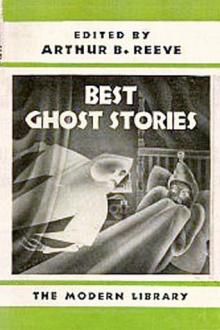In a Steamer Chair and Other Stories - Robert Barr (rm book recommendations .TXT) 📗

- Author: Robert Barr
Book online «In a Steamer Chair and Other Stories - Robert Barr (rm book recommendations .TXT) 📗». Author Robert Barr
"What's the matter, Plodkins?" I said. "Are you ill? What's the matter with you? Shall I call for help?"
There was a feeble negative motion of the head. Then he said, in a whisper, "Is the door bolted?"
"Yes," I answered.
After another moment's pause, I said--
"Shall I ring, and get you some whiskey or brandy?"
Again he shook his head.
"Help me to get up," he said feebly.
He was very much shaken, and I had some trouble in getting him on his feet, and seating him on the one chair in the room.
"You had better come to my state-room," I said; "it is nearer than yours. What has happened to you?" He replied, "I will go in a moment. Wait a minute." And I waited.
"Now," he continued, when he had apparently pulled himself together a bit, "just turn on the electric light, will you?"
I reached up to the peg of the electric light and turned it on. A shudder passed over Plodkins' frame, but he said nothing. He seemed puzzled, and once more I asked him to let me take him to my stateroom, but he shook his head.
"Turn on the water." I did so.
"Turn out the electric light." I did that also.
"Now," he added, "put your hand in the water and turn on the electric light."
I was convinced Plodkins had become insane, but I recollected I was there alone with him, shaky as he was, in a room with a bolted door, so I put my fingers in the water and attempted to turn on the electric light. I got a shock that was very much greater than that which I received when I saw Plodkins lying at the bottom of the bath-tub. I gave a yell and a groan, and staggered backwards. Then Plodkins laughed a feeble laugh.
"Now," he said, "I will go with you to your state-room."
The laugh seemed to have braced up Plodkins like a glass of liquor would have done, and when we got to my state-room he was able to tell me what had happened. As a sort of preface to his remarks, I would like to say a word or two about that bath-tub. It was similar to bath-tubs on board other steamers; a great and very deep receptacle of solid marble. There were different nickel-plated taps for letting in hot or cold water, or fresh water or salt water as was desired; and the escape-pipe instead of being at the end, as it is in most bath-tubs, was in the centre. It was the custom of the bath-room steward to fill it about half full of water at whatever temperature you desired. Then, placing a couple of towels on the rack, he would go and call the man whose hour it was to bathe.
Plodkins said, "When I went in there everything appeared as usual, except that the morning was very dark. I stood in the bath-tub, the water coming nearly to my knees, and reached up to turn on the electric light. The moment I touched the brass key I received a shock that simply paralyzed me. I think liquor has something to do with the awful effect the electricity had upon me, because I had taken too much the night before, and was feeling very shaky indeed; but the result was that I simply fell full length in the bath-tub just as you found me. I was unable to move anything except my fingers and toes. I did not appear to be hurt in the least, and my senses, instead of being dulled by the shock, seemed to be preternaturally sharp, and I realized in a moment that if this inability to move remained with me for five minutes I was a dead man--dead, not from the shock, but by drowning. I gazed up through that clear green water, and I could see the ripples on the surface slowly subsiding after my plunge into the tub. It reminded me of looking into an aquarium. You know how you see up through the water to the surface with the bubbles rising to the top. I knew that nobody would come in for at least half an hour, and even then I couldn't remember whether I had bolted the door or not. Sometimes I bolt it, and sometimes I don't. I didn't this morning, as it happens. All the time I felt that strength was slowly returning to me, for I continually worked my fingers and toes, and now feeling seemed to be coming up to my wrists and arms. Then I remembered that the vent was in the middle of the bath-tub; so, wriggling my fingers around, I got hold of the ring, and pulled up the plug. In the dense silence that was around me, I could not tell whether the water was running out or not; but gazing up towards the ceiling I thought I saw the surface gradually sinking down and down and down. Of course it couldn't have been more than a few seconds, but it seemed to be years and years and years. I knew that if once I let my breath go I would be drowned, merely by the spasmodic action of my lungs trying to recover air. I felt as if I should burst. It was a match against time, with life or death as the stake. At first, as I said, my senses were abnormally sharp, but, by and by, I began to notice that they were wavering. I thought the glassy surface of the water, which I could see above me, was in reality a great sheet of crystal that somebody was pressing down upon me, and I began to think that the moment it reached my face I would smother. I tried to struggle, but was held with a grip of steel. Finally, this slab of crystal came down to my nose, and seemed to split apart. I could hold on no longer, and with a mighty expiration blew the water up towards the ceiling, and drew in a frightful smothering breath of salt water, that I blew in turn upwards, and the nest breath I took in had some air with the water. I felt the water tickling the corners of my mouth, and receding slower and slower down my face and neck. Then I think I must have become insensible until just before you entered the room. Of course there is something wrong with the electric fittings, and there is a leak of electricity; but I think liquor is at the bottom of all this. I don't believe it would have affected me like this if I had not been soaked in whiskey."
"If I were you," I said, "I would leave whiskey alone."
"I intend to," he answered solemnly, "and baths too."
A CASE OF FEVER.
"O, underneath the blood red sun,
No bloodier deed was ever done!
Nor fiercer retribution sought
The hand that first red ruin wrought."
This is the doctor's story--
The doctors on board the Atlantic liners are usually young men. They are good-looking and entertaining as well, and generally they can play the violin or some other instrument that is of great use at the inevitable concert which takes place about the middle of the Atlantic. They are urbane, polite young men, and they chat pleasantly and nicely to the ladies on board. I believe that the doctor on the Transatlantic steamer has to be there on account of the steerage passengers. Of course the doctor goes to the steerage; but I imagine, as a general thing, he does not spend any more time there than the rules of the service compel him to. The ladies, at least, would be unanimous in saying that the doctor is one of the most charming officials on board the ship.
This doctor, who tells the story I am about to relate, was not like the usual Atlantic physician. He was older than the average, and, to judge by his somewhat haggard, rugged face, had seen hard times and rough usage in different parts of the world. Why he came to settle down on an Atlantic steamer--a berth which is a starting-point rather than a terminus--I have no means of knowing. He never told us; but there he was, and one night, as he smoked his pipe with us in the smoking-room, we closed the door, and compelled him to tell us a story.
As a preliminary, he took out of his inside pocket a book, from which he selected a slip of creased paper, which had been there so long that it was rather the worse for wear, and had to be tenderly handled.
"As a beginning," said the doctor, "I will read you what this slip of paper says. It is an extract from one of the United States Government Reports in the Indian department, and it relates to a case of fever, which caused the death of the celebrated Indian chief Wolf Tusk.
"I am not sure that I am doing quite right in telling this story. There may be some risk for myself in relating it, and I don't know exactly what the United States Government might have in store for me if the truth came to be known. In fact, I am not able to say whether I acted rightly or wrongly in the matter I have to tell you about. You shall be the best judges of that. There is no question but Wolf Tusk was an old monster, and there is no question either that the men who dealt with him had been grievously--but, then, there is no use in my giving you too many preliminaries; each one will say for himself whether he would have acted as I did or not. I will make my excuses at the end of the story." Then he read the slip of paper. I have not a copy of it, and have to quote from memory. It was the report of the physician who saw Wolf Tusk die, and it went on to say that about nine o'clock in the morning a heavy and unusual fever set in on that chief. He had been wounded in the battle of the day before, when he was captured, and the fever attacked all parts of his body. Although the doctor had made every effort in his power to relieve the Indian, nothing could stop the ravages of the fever. At four o'clock in the afternoon, having been in great pain, and, during the latter part, delirious, he died, and was buried near the spot where he had taken ill. This was signed by the doctor.
"What I have read you," said the physician, folding up the paper again, and placing it in his pocket-book, "is strictly and accurately true, otherwise, of course, I would not have so reported to the Government. Wolf Tusk was the chief of a band of irreconcilables, who were now in one part of the West and now in another, giving a great deal of trouble to the authorities. Wolf Tusk and his band had splendid horses, and they never attacked a force that outnumbered their own. In fact, they never





Comments (0)